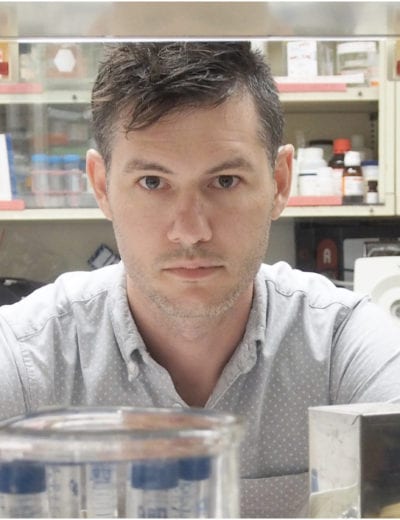Dr. Liddelow’s project centers on how astrocytes contribute to the effects of peripheral inflammation on the brain. Astrocytes play multiple roles in support of normal brain functions, but mounting an inflammatory response is one of their most well-known roles. However, even within this single role, the story is complex. Previous research from the Liddelow lab shows that astrocytes respond to inflammation or injury in diverse ways. Depending on the context, they take on different reactive states that may ultimately benefit or harm neuron health. Recently, the lab described a new type of reactive astrocyte that responds to an inflammatory cytokine called interferon (IFN). While type 2 IFN is largely produced in the periphery, there is growing evidence suggesting that both type 1 and type 2 interferon responses play an important role in Alzheimer’s disease brains. As these IFN reactive cells are found near brain borders—around vasculature and ventricles—they seem ideally positioned to respond to and potentially propagate peripheral immune signals in the brain. Therefore, the team hypothesized that IFN reactive astrocytes normally respond to peripheral immune signals to protect and preserve healthy brain function and that this system is negatively impacted by amyloid during Alzheimer’s disease.
The Liddelow team is pursuing three aims using mouse models, measures of neuronal function, and advanced sequencing techniques for gene and protein expression. In their first aim, they are determining whether and on what time course peripheral injections of IFN, other cytokines, and LPS are triggering astrocyte activation in the brain. In the second aim, the team is investigating if IFN is the intermediary signal between the periphery and brain astrocytes following LPS injection. In their third aim, they are examining whether IFN signaling in astrocytes is affected by and potentially contributes to amyloid pathology in 5xFAD mice.
During their first year of funding, the team has made substantial progress on the first two aims. They uncovered that IFN signaling is critical in helping astrocytes recover from a neurotoxic reactive state, restoring normal function through self-driven (cell-autonomous) and external (non-cell-autonomous) mechanisms. Additionally, they found that IFN-treated astrocytes function as atypical antigen-presenting cells, actively upregulating genes involved in antigen presentation and triggering T cell responses. These findings highlight IFN’s dual role in shaping astrocyte behavior and driving immune signaling. In the next phase, the team will study how IFN influences astrocyte responses to amyloid pathology.


